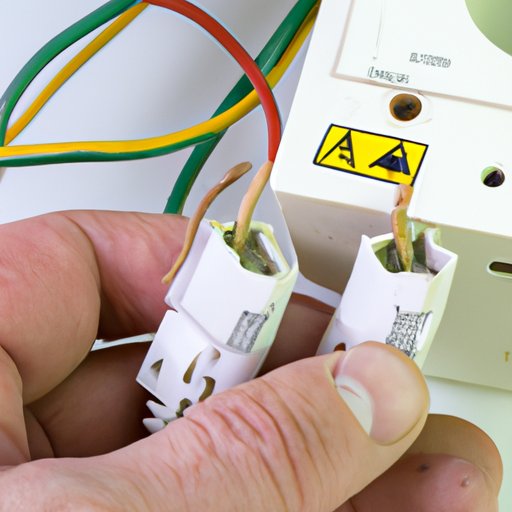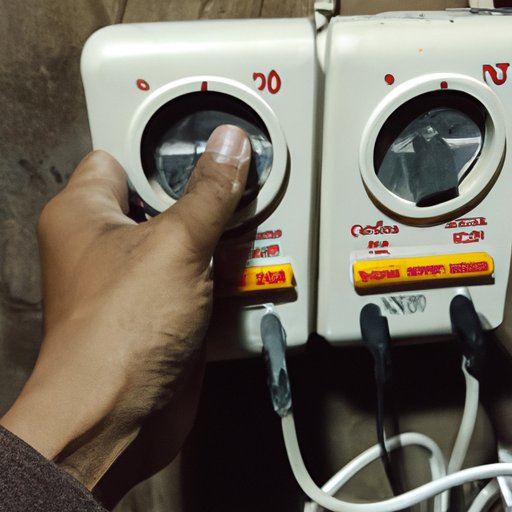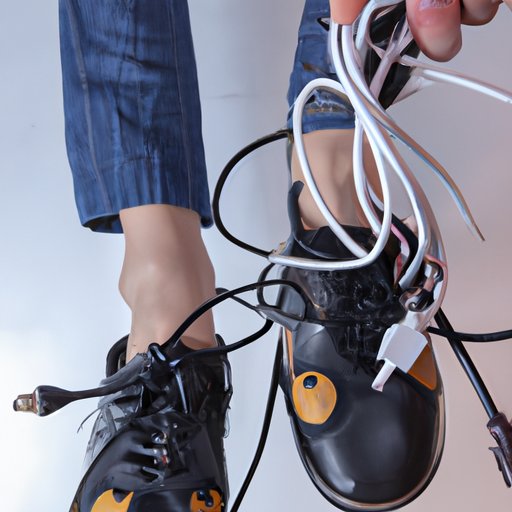Introduction
Electricity is an essential part of everyday life, but it can also be dangerous if not handled properly. Each year, thousands of people suffer electric shocks, some of which can be deadly. To prevent this from happening, it’s important to know how to stay safe when working with electricity. This article will explore six key steps you can take to reduce the risk of being electrically shocked.
Wear Rubber-Soled Shoes When Working with Electricity
One of the most important steps you can take to avoid being electrically shocked is to wear rubber-soled shoes. Rubber-soled shoes are made with a material that does not conduct electricity, so they provide an extra layer of protection between your feet and any potential electrical hazards. In addition to providing insulation, rubber-soled shoes also offer good grip, which can help prevent slips and falls.
The potential hazards of not wearing rubber-soled shoes while working with electricity are significant. If your feet come in contact with a live wire, you could receive a severe electric shock and suffer serious injuries such as burns or even death.

Check for Frayed Cords and Exposed Wiring before Using Electrical Equipment
Before using any electrical equipment, it’s important to check for frayed cords or exposed wiring. Frayed cords and exposed wiring are both signs of potential danger and should be addressed immediately. If you notice any fraying or exposed wiring, do not use the equipment and contact a professional electrician for help.
The benefits of regularly checking for damage to electrical equipment are clear. Not only does it reduce the risk of electric shock, it can also help prevent fires caused by faulty wiring. On the other hand, the potential hazards of not checking for damage are just as serious. If you use an appliance with frayed cords or exposed wiring, you could receive a severe electric shock or start a fire.

Make Sure Your Hands Are Dry When Handling Electrical Equipment
When handling electrical equipment, it’s important to make sure your hands are dry. Even a small amount of moisture on your hands can increase the risk of electric shock. If your hands are wet, use a dry cloth to wipe them off before touching any electrical equipment.
The benefits of keeping your hands dry when handling electrical equipment are obvious. By doing so, you reduce the risk of electric shock and can protect yourself from potentially serious injury. On the other hand, the potential hazards of having wet hands when handling electrical equipment are just as serious. If your hands are wet and come in contact with a live wire, you could receive a severe electric shock.

Avoid Wearing Jewelry or Loose Clothing when Working with Electricity
It’s also important to avoid wearing jewelry or loose clothing when working with electricity. Jewelry and loose clothing can easily get caught on live wires and cause an electric shock. It’s best to remove all jewelry and tight-fitting clothing before starting any work with electricity.
The benefits of avoiding jewelry and loose clothing when working with electricity are clear. By doing so, you reduce the risk of electric shock and protect yourself from potentially serious injury. On the other hand, the potential hazards of not avoiding jewelry and loose clothing are just as serious. If your jewelry or clothing gets caught on a live wire, you could receive a severe electric shock.
Unplug Electrical Appliances when Not in Use
Finally, it’s important to unplug electrical appliances when they are not in use. Even when an appliance is turned off, it can still draw power from the outlet, increasing the risk of electric shock. Unplugging the appliance completely eliminates this risk.
The benefits of unplugging electrical appliances when not in use are obvious. By doing so, you reduce the risk of electric shock and can protect yourself from potentially serious injury. On the other hand, the potential hazards of not unplugging electrical appliances are just as serious. If an appliance is left plugged in and a live wire touches it, you could receive a severe electric shock.
Conclusion
Electricity can be dangerous if not handled properly, so it’s important to take the necessary precautions to protect yourself. This article has explored six key steps you can take to reduce the risk of being electrically shocked. These include wearing rubber-soled shoes, checking for frayed cords and exposed wiring, making sure your hands are dry when handling electrical equipment, avoiding jewelry and loose clothing, and unplugging electrical appliances when not in use.
By following these simple steps, you can significantly reduce the risk of electric shock and protect yourself from harm.
(Note: Is this article not meeting your expectations? Do you have knowledge or insights to share? Unlock new opportunities and expand your reach by joining our authors team. Click Registration to join us and share your expertise with our readers.)
